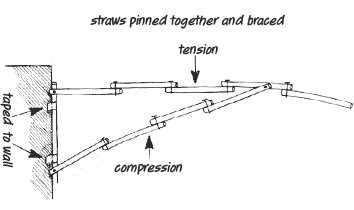|
|||||||
What's Going On
(continued)

All structural action consists
of tension and/or compression. In these structures, this means that every
straw is either in tension or compression. It is interesting to go through
a few structures with your students to try to figure out which straws
are in tension and which are in compression. You can determine if you
are correct by pulling out a pin on one end of the straw. If the two points
where the ends of the straw had been attached move apart, the straw was
under tension. If the two points move toward each other, the straw was
under compression. It is interesting to compare where the tension and
compression elements are in bridges versus cantilevers. In compression
bridges, which are supported (held up) at both ends, the line of straws
along the top are in compression and the line of straws along the bottom
are in tension. In cantilevers, which are supported (held up) at one end,
the opposite is true. Here, the line of straws along the top are in tension
and the line of straws along the bottom are in compression.
Many engineering principles emerge from these activities. Your students
will readily volunteer that "triangles are strong," and you will most
likely see examples of diagonal bracing put in to stabilize square sections.
Pin joints are common in real structures. For instance, rivets are used
with steel beams and nails are used with wood planks in the same way that
pins are used with straws in this activity.
![]()

